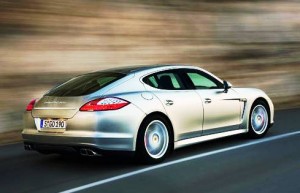Porsche, in the process of being swallowed whole by Volkswagen AG after its reckless takeover bid for Europe’s largest carmaker failed, resorted to the 911 to bring the discussion back to its expanding product line at Frankfurt Motor Show.
The company said sales were off 24% in its fiscal year that ended July 31, but claimed the worst of its global sales decline was now over.
Porsche sold 75,200 vehicles and income dropped 12% to €6.6 billion or $10 billion in the fiscal year. Sales of the 911 were down -14% to 27,100; Cayenne sports utility vehicle -25% to 34,300; Boxster dropped -40% to 13,100.
Four variations of the 911 appeared on the show stand, and the Leipzig-built Panamera four-door appeared just in time for its market launch in Europe.
Porsche showed the latest-generation 911 Turbo in both coupe and cabriolet models. Premiering alongside the venerable turbo were a series of variants, including the 911 GT3 RS, a “race ready” 911 GT3 Cup car, and a “limited edition” 911 Sport Classic, which won’t come to the United States.
The four-door Panamera is the real news, and the real product bet in the depressed global economy. The car represents Porsche’s much debated and much delayed fourth model line. A four-door was under consideration at Porsche more than two decades ago, but the conservative German maker eschewed a saloon and ultimately gambled on what became a successful bet on a truck – the Cayenne sport utility vehicle.
When Porsche finally announced it would build the brand’s first four-passenger car four years ago, the discussions began anew as to whether this could be a “true” Porsche. (It also allowed Aston Martin to prepare a similar offering, the four-door Rapide, which is also at Frankfurt)
This “true believer” debate appears with dreary regularity every time the company changes or adds something, such as a VW-based 914, an Audi-built 924, or a water-cooled boxer engine in the 911, or a front-engine V8-powered 928.
“Although the car has only been at the dealership for three days, we already have 4,500 orders for the Panamera, most of them from customers who have not even seen the car yet,” said Porsche’s new president and CEO, Michael Macht.
As with the similar Cayenne controversy, money ultimately talks.
If the Panamera, which will be available at U.S. Porsche dealerships on October 17, is as successful as the truck that doubled sales at one point, then the company will move on to tweaking the 911 yet again – unless VW has other ideas.



Nice job Ken,
Especially liked the “dreary” assessment of past coverage of the so-called “analysis” of Porsche’s line additions… So true. With the exception of perhaps the 924 (fixed with 944), I’d like to say most transitions have been pretty successful and the engineers usually have broken some new ground technically, or made better good ideas, but not well executed engineering-wise by other makers.